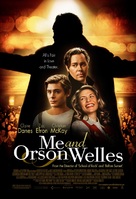Reviews provided by RottenTomatoes
A.O. Scott, At the Movies: You feel a little bit what it was like to sit in that theater on opening night. You also feel like what it was and what it still is to be a young person infatuated with writing, with art, with theater... Read more
Michael Phillips, Chicago Tribune: A real charmer, Me and Orson Welles is the work of a director who takes nostalgia, romantic possibility and the theater seriously, without being a pill about it. Read more
A.O. Scott, New York Times: The story of a teenager's sometimes uncomfortable brush with greatness, it is necessary viewing for anyone whose imagination has been seduced by the charms of art. Read more
Joe Morgenstern, Wall Street Journal: Efron's fix on the period suggests a GPS struggling in a low-signal area, and the movie becomes an affectionate, name-dropping exercise in historical mutilation. Read more
Moira MacDonald, Seattle Times: Linklater keeps everything bouncing along, in sepia light and roar-of-the-greasepaint dust, giving us a little lesson in theater history along with an appealing coming-of-age tale. Read more
Nathan Rabin, AV Club: A terminally bland coming-of-age story about a pretty young man with the worlda(TM)s most awesome after-school job. Read more
Ty Burr, Boston Globe: Read more
Tom Long, Detroit News: A thoroughly enjoyable film that wraps a coming-of-age story around the portrait of a genius. Read more
Betsy Sharkey, Los Angeles Times: As in life, the presence of Welles never fails to overtake things and McKay's command of the subject is so Welles-ian that when he's in a scene everyone else fades a little. And neither [Linklater] nor the film ever quite recover from that. Read more
Jeremy McCarter, Newsweek: Welles comes off as an imperious, duplicitous, philandering brat. But he's also funny, seductive, and ingenious. Read more
David Denby, New Yorker: Quippy, fast, and enjoyably corny, Welles is like a musical comedy without songs. Read more
Stephen Whitty, Newark Star-Ledger: I'm getting very weary of filmmakers making up conversations, inventing motives and creating events so that their "based on a real story" movie can get to "the real truth." Because, actually, there's only one real truth. Read more
Elizabeth Weitzman, New York Daily News: Surprisingly conventional by director Richard Linklater's standards, this pleasant, low-key dramedy is most memorable for the discovery of co-star Christian McKay. Read more
Lou Lumenick, New York Post: One of the best pictures about the stage in recent memory. Read more
Steven Rea, Philadelphia Inquirer: Linklater's film adaptation succeeds in bringing the flamboyant Welles to life, without resorting to caricature (although a few vintage Al Hirschfelds adorn the walls). Read more
James Berardinelli, ReelViews: In a departure from his usual intimate, character-based fare, director Richard Linklater paints on a broad cinematic canvas that brings Depression-era Broadway vividly to life. Read more
Roger Ebert, Chicago Sun-Times: The impersonation of Welles by Christian McKay in Me and Orson Welles is the centerpiece of the film, and from it, all else flows. We can almost accept that this is the Great Man. Read more
Peter Travers, Rolling Stone: What do you say about a movie that proves Zac Efron can act, introduces a master thespian in Christian McKay and launches a charm assault that is damn near irresistible? Read more
Stephanie Zacharek, Salon.com: This is a standard coming-of-age story set in a milieu that's anything but standard, and that's what keeps the picture's motor running. Read more
Mick LaSalle, San Francisco Chronicle: I forgot that I was looking at an actor. I really believed I was looking at Welles. Read more
Colin Covert, Minneapolis Star Tribune: Me and Orson Welles is a little velvet sack of diamonds. It's a sparkling love letter to a gigantic talent, a romance, a comedy, a drama. Read more
Joe Williams, St. Louis Post-Dispatch: The most resonant voice belongs to Welles, or rather to McKay, who uncannily channels the charm, ego and flim-flammery of the man who would soon move to Hollywood to direct and star in Citizen Kane. Read more
Liam Lacey, Globe and Mail: The very name Orson Welles stands for genius wasted and betrayed, and the movie offers some foreshadowing of his triumphs and failures to come. Read more
Peter Howell, Toronto Star: Working with the fact-based eponymous novel by Robert Kaplow, first-time screenwriters Holly Gent Palmo and Vince Palmo are content to follow the contours of a standard behind-the-scenes story about the staging of a play. Read more
Mary F. Pols, TIME Magazine: Welles is brilliantly embodied by Christian McKay in one of those, hey-who's-that? performances that tends to draw Oscar talk, even if the film itself isn't much more than an extremely pleasant lark. Read more
Dave Calhoun, Time Out: There's a strong ensemble flavour, characterised by the simultaneously selfish and clubbable tendencies of the actors, which makes for a lightly comic experience but also for a portrait of a theatre company that feels warm and true. Read more
Todd McCarthy, Variety: There are moments, especially when Welles is alternating between acting as Brutus and directing everyone else, that it's possible to forget you're watching an actor and really believe you're beholding Orson Welles at work. Read more
J. Hoberman, Village Voice: Deft, affectionate, and unexpectedly enjoyable. Read more
Michael O'Sullivan, Washington Post: It's an open question as to who, outside theater geeks, will find this inside-baseball approach quite as fascinating as Linklater apparently does. Read more

